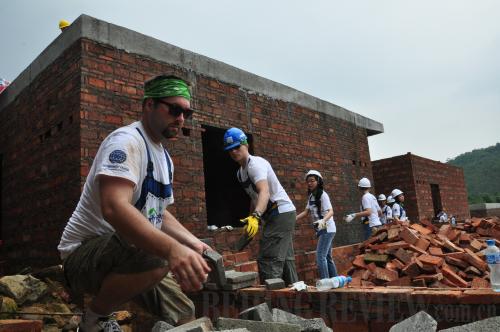|
 |
|
JOINT EFFORT: Volunteers from One Foundation build houses for villagers in Weidong Village in Conghua City, Guangdong Province, on May 12, 2012 (ZHANG YUAN) |
'Public' foundation
Since its inception, Li wishes to run One Foundation like a listed company. He regards every donor as a shareholder of his organization.
"One Foundation gathers people who have a common dream, that is, to serve every 'shareholder' with their expertise," Li said.
Currently, many celebrity entrepreneurs sit in the foundation's board, including Wang Shi, founder of China's largest residential real estate developer Vanke Co. Ltd., Ma Weihua, former President and CEO of the China Merchants Bank, and Jack Ma Yun, founder of e-commerce giant Alibaba Group.
Li said that he invited so many famous entrepreneurs on the foundation's board because they can boost public confidence in it. These entrepreneurs, each controlling assets worth billions of dollars, have no need to embezzle donations.
Moreover, these entrepreneurs can create operation platforms for the foundation. "With their business acumen, these entrepreneurs understand One Foundation at the outset, endorse it and would like to serve in its board to see its sustainable development," Li said.
In 2008, the China Merchants Bank and One Foundation jointly issued a charity credit card. Under their agreement, the bank donates 1 yuan for every new card issued, and 0.1 yuan every time it is swiped thereafter. According to the bank, from December 2008 to March 2013, a total of 8.5 million yuan ($1.38 million) had been donated in this way.
At the Global Mobile Internet Conference that began in Beijing on May 7, One Foundation launched a joint charity program with conference organizer GWC, a membership organization for executives from mobile and Internet companies around the globe. The program aims to raise funds via mobile Internet.
One Foundation was originally launched as a project of the Red Cross Society of China (RCSC), the country's largest charity, because registration procedures at that time required that a social organization must be supervised by a government department. After a pilot program was launched to allow certain types of organizations to directly register with civil affairs authorities, it was registered as an independent public foundation on December 3, 2010 in Shenzhen, south China's Guangdong Province.
Charity reform
The credibility of the RCSC has plunged since June 2011 when a 20-year-old woman known by her microblog name Guo Meimei flaunted her wealth and claimed to be a manager of the organization. Guo raised suspicion that donated money has been embezzled to finance the lavish lifestyle of the organization's employees.
Despite subsequent internal reforms, the approval ratings of the RCSC have remained low, prompting growing calls for a thorough reform of government-run charities. Some people have proposed to let non-governmental organizations such as One Foundation replace the RCSC to play a primary role in the area.
Li said that One Foundation alone is unable to handle a variety of problems facing Chinese society and it aims to explore a sound development model that can be followed by other public and private charities as well as non-governmental organizations.
With millions of volunteers, the RCSC has traditionally played a leading role in disaster relief in China. It now has branch organizations in almost all provincial, prefectural and township level administrative units. "No other foundation in the country can afford the operating cost of such a colossal organization or shoulder such huge responsibilities," Li said.
Li said that now the public demands for transparent and professional charitable organizations, if some traditional organizations are too slow in reforming themselves, they will fall short of people's expectations.
He expressed thoughts that public scrutiny is a blessing in disguise for the RCSC, which must change to meet rational social demands.
On the other hand, Li suggests that the public should give more time to the RCSC and believe that it will improve. "Not doing a good job now does not mean that it will not do a good job in the future," he said.
Email us at: zengwenhui@bjreview.com | 